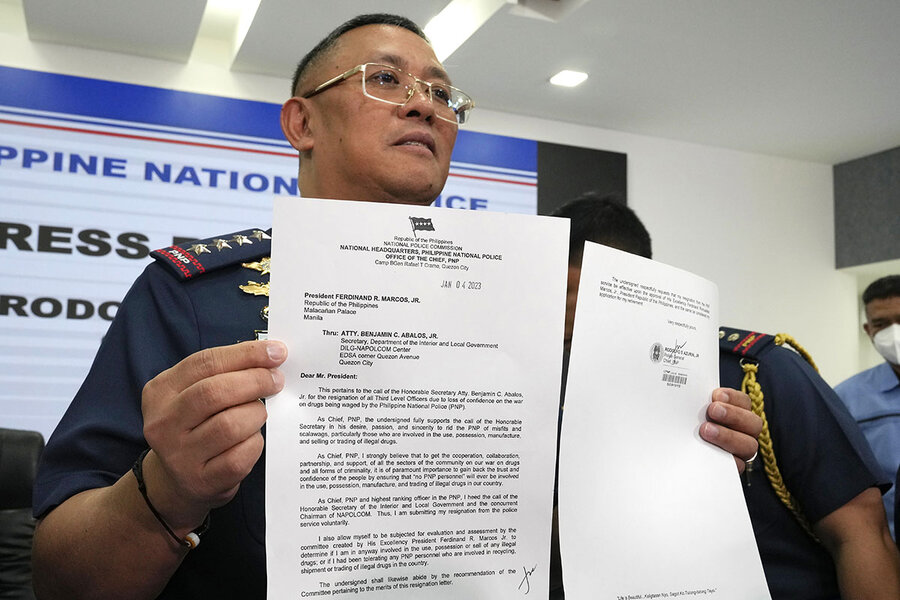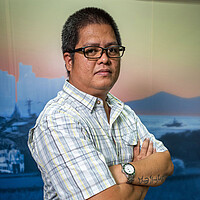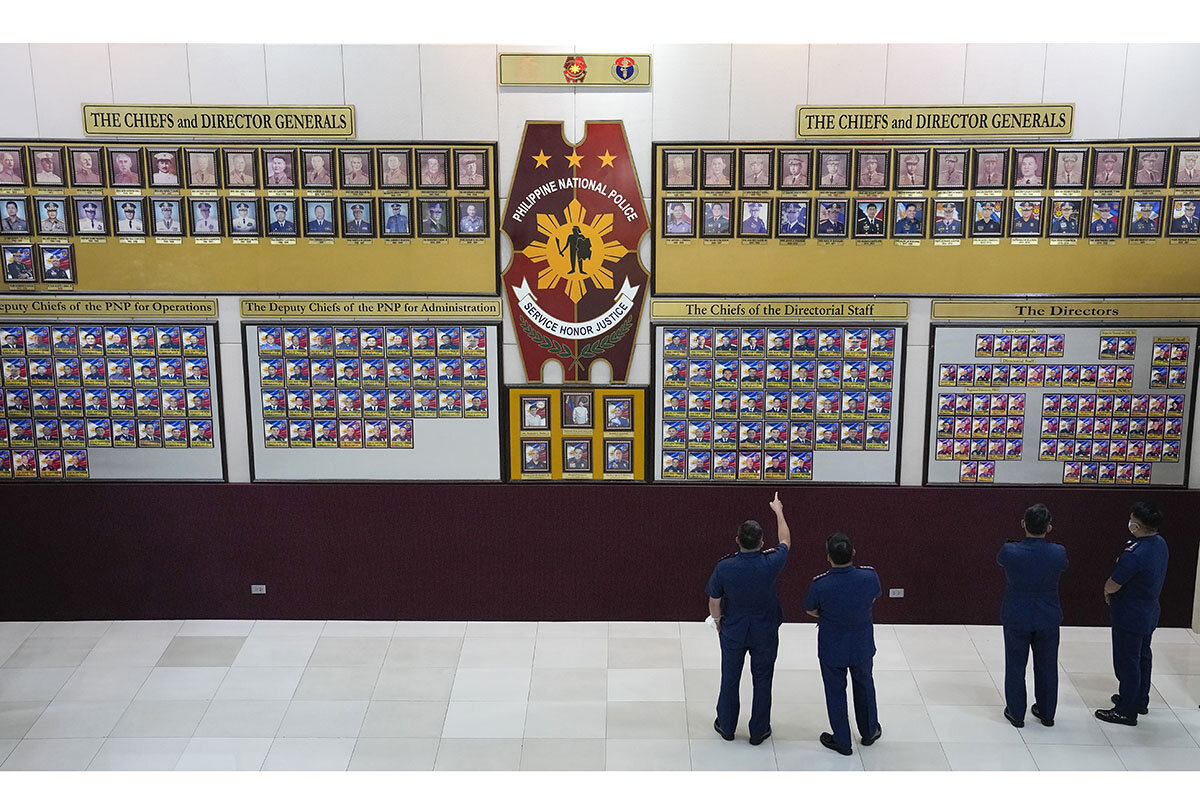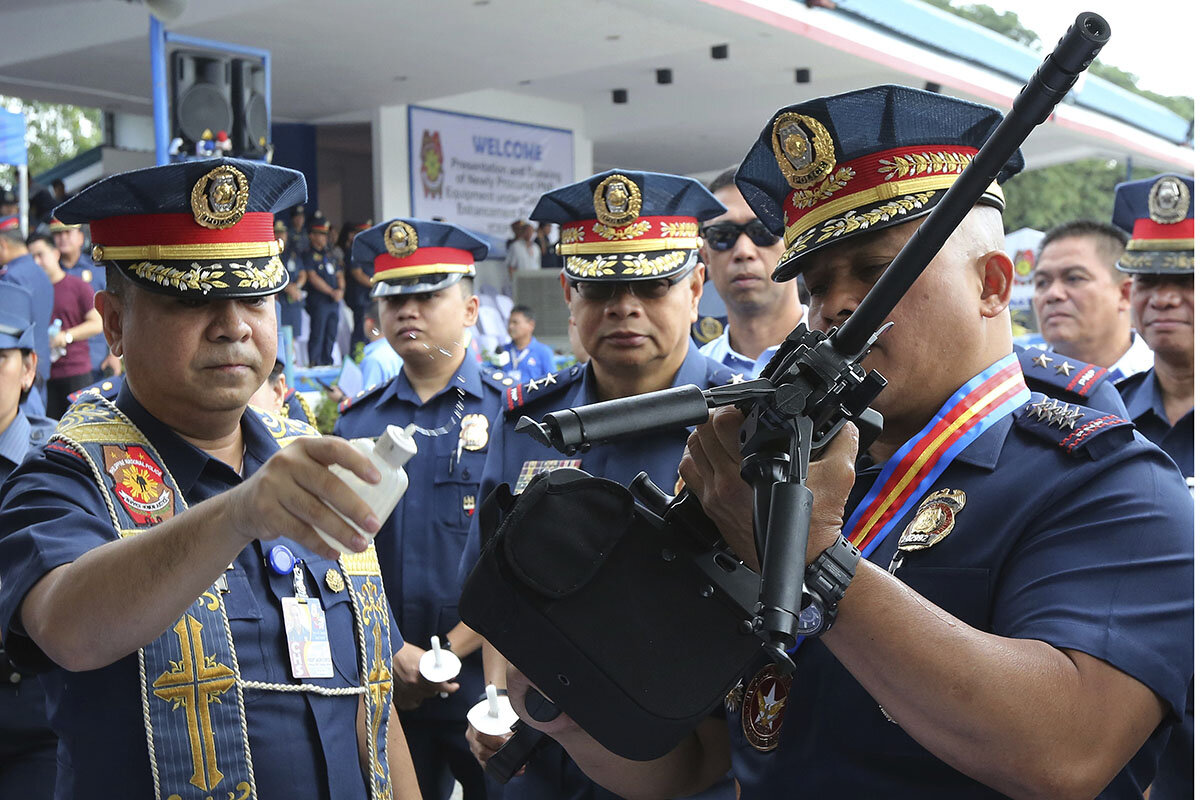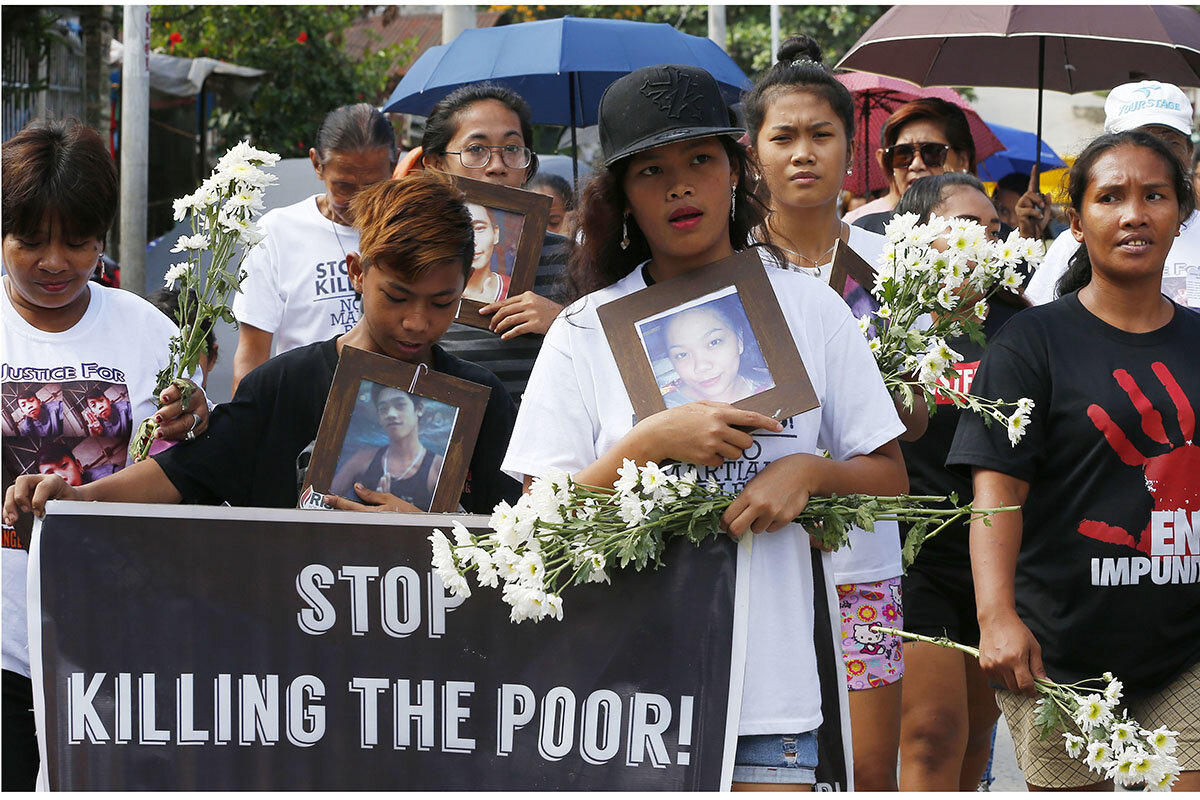Hundreds of Philippine police are filing their resignations. Why?
Loading...
| Manila, Philippines
For years, the Philippine National Police (PNP) has been on the front lines of the countryтs violent war on drugs, and all the corruption that comes with it. Now, in a bid to restore public trust as leaders recalibrate the countryтs anti-drug strategy, Interior Secretary Benjamin тBenhurт Abalos Jr. has urged all senior officers to voluntarily resign by Jan. 31.
So far, some 900 generals and colonels have offered to vacate their posts, but will continue working until a committee assesses their links to the drug trade and decides whether to accept or reject their resignation.
Mr. Abalos admitted that the тvery radical approachт is a тshortcutт to the lengthy judicial process. тItтs hard to fight in a war when your ally will be the one to shoot you in the back,т he told reporters in a news briefing. тWe need to cleanse our ranks. The people who trust us must trust us even more.т
Why We Wrote This
A story focused onThe ongoing purge of police officers involved in the Philippinesт illegal drug trade could make way for a less violent war on drugs, but victims say it does little to deliver justice for past offenses.
While some welcome the pivot away from former President Rodrigo Duterteтs laissez-faire approach to police misconduct, few see it as a legitimate step toward justice. Rights advocates and victims of the drug war have criticized Mr. Abalosт focus on the PNPтs top brass and his reliance on internal reviews, saying the resignation plan sidesteps existing processes for accountability.
тIt is not a shortcut; it is a deviation,т says Carlos Conde, a senior researcher with the Asia Division of Human Rights Watch, describing Mr. Abalosт call as тa PR stunt.тТ
тIf the government is really serious, it should investigate the cases that implicate the police in the extrajudicial killings, planting of evidence, other human rights abuses, and involvement in the illegal drug trade,т he says.Т
Problem in all ranks
The Philippine drug war has claimed up to 30,000 lives, according to rights groups. Lawyer Kristina Conti of the National Union of Peopleтs Lawyers argues that everyone in the PNP, including those in the lower ranks, must be investigated.
The police тwere given so much latitude in implementing the war on drugs. There was a blanket toleration of any abuse,т says Ms. Conti, an assistant to counsel for the International Criminal Courtтs probe into the drug war. тThe promise of absolution ... emboldened police officers to commit crimes.т
In addition to extrajudicial killings, the issue of stealing and reselling illegal drugs has long marred the governmentтs campaign. Indeed, the recent call for resignation came amid growing reports that cops were underreporting seized drugs.
In October, for example, two anti-narcotics operatives allegedly sneaked 42 kilograms of methamphetamine т worth more than $5 million т out of a massive drug raid at a lending agency office reportedly owned by police Master Sgt. Rodolfo Mayo Jr., who was assigned to the PNPтs Drug Enforcement Group and arrested the following day with 2 kilograms of drugs in his car.Т
Several politicians and public officials, including a group of 147 city governments, have expressed support for cleaning up police ranks. The League of Cities of the Philippines called Mr. Abalosт appeal тnecessary in upholding the principles enshrined in our Constitutionт and тan opportunity to defend the honor and sacrifices of police officers.т
Among the resolutionтs signatories was Baguio City Mayor Benjamin Magalong, a former PNP general who was recently named to a five-person committee that will investigate police officialsт links to the drug trade.Т
Keeping offenders тout of ... sightт
In a press conference Jan. 13, Mr. Abalos said the names of police officials found to have links with the illegal drug trade will remain confidential. Charges against them will be тpursued in court as mandated by law,т he explained, but if the evidence is weak, the government should тlet them retire peacefully.тТ
That plan inspires little trust in Mary Ann Domingo, whose son and husband were killed in September 2016 during the height of President Duterteтs war on drugs.
тThe public do not have access to police internal investigation,т she says. тWe wonтt know if they really hold those who are accountable, especially those who are involved in drug-related cases, or if they just keep them out of public sight.т
Cristina Palabay, secretary-general of the human rights alliance Karapatan, agrees that the push for internal cleansing тis a superficial strategy that will barely scratch the surfaceт of police involvement in the drug trade.
тInstead of strengthening the capacity ... to swiftly investigate and judiciously punish and resolve cases involving corrupt practices of police officials, this strategy gives them an easy way out of scrutiny by the public,т she says.Т
Killing continues
Mr. Abalosт internal cleansing strategy is backed by President Ferdinand тBongbongт Marcos Jr., who assumed office last summer and sees the purge as part of a тrecalibratedт war on drugs.Т
Last year, Mr. Marcos announced that his administration will sustain the anti-narcotics campaign launched under Mr. Duterte, but with a focus on preventing the use of illegal drugs and the rehabilitation of users.
тWe are looking more for the upstream, upstream of the problem, the prevention,т he said in a televised show. тLet us teach the children: тDo not go there. You wonтt achieve anything. Most of those who went there were either jailed or are now dead. So why would you want that?ттТ
Yet even with the recalibrated approach, authorities have reported some 61 deaths related to the anti-narcotics campaign since Mr. Marcos took office in July. Dahas, a monitoring project by the University of the Philippines Dilimanтs Third World Studies Center, counted 175 drug-related killings from July 1 to Dec. 31, 2022 т higher than the death toll during Mr. Duterteтs last six months in office.Т
Phil Robertson, deputy director of Human Rights Watchтs Asia Division, says the government has to provide тreal changes on the groundт if the Marcos administration тis serious about reversing some of the damage done to the human rights records in the Philippines by Duterte.тТ
For those whoтve lost loved ones in the war on drugs, reversing that damage requires justice. But holding the perpetrators accountable is next to impossible тif the justice system will continue to favor those who are in power,т says Mrs. Domingo, the widow.
Sheтs filed complaints against the police officers who back in 2016 allegedly shot her husband and son to death. The Office of the Ombudsman did not find basis for murder charges, as Mrs. Domingo originally sought, instead opting for the less severe and bailable offense of homicide. The case т one of the few filed against police officers during Mr. Duterteтs war on drugs т is still ongoing.
тThe governmentтs move to allow police officers to voluntarily quit is an additional layer of agony and anxiety for families,т she says. тWe will spend our lives looking over our shoulders because the people responsible for the deaths of our loved ones are free.т



